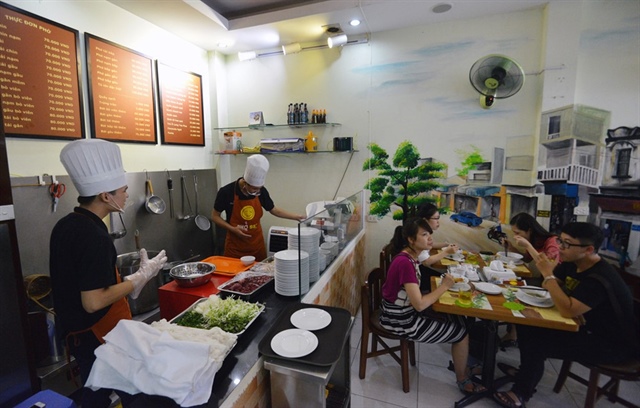From the beginning of 2026, the tax registration method for households and personal businesses will be officially terminated according to the National Assembly’s resolution on mechanisms and policies to develop the private economy. Instead, business households must switch to declaring taxes based on actual revenue, and this roadmap has been shortened by six months compared to the initial plan.
Currently, there are over five million business households in the country. However, nearly two million of them are still paying taxes through the registration method, with an average tax amount of only about 700,000 VND (approximately 30 USD) per month.
The elimination of the tax registration method, along with incentives for small and medium-sized enterprises (SMEs), as stipulated in the National Assembly’s resolution on mechanisms and policies to develop the private economy, is expected to create a fair and transparent business environment, encouraging business households to transform into enterprises.
Business households still hesitate to grow
In reality, many business households are concerned about the time and costs associated with tax declaration, accounting, and invoice issuance, which may affect their revenue and profits.
Ms. Pham Linh Chi, the owner of a shop selling essential consumer products on Ho Tung Mau Street, Bac Tu Liem District, Hanoi, shared that she has been running her business for over ten years and is currently paying a tax of 800,000 VND (approximately 34 USD) per month through the registration method, along with an annual business license tax of one million VND (approximately 43 USD). This amount is just enough to maintain her stable business operation.

Many business households are hesitant to grow due to concerns about increased costs. Photo: MINH TRÚC |
“I’m not sure how much additional costs I will incur when switching to the new tax declaration method and registering as an enterprise. The bookkeeping process will also become more complicated. If I can’t handle it myself, I will have to hire someone, which adds to the expenses. I’m not sure if I can sustain my business because I only serve customers in this area,” she expressed her concerns.
Mr. Nguyen Vu Hai Nam, the owner of a clothing store on Pham Ngoc Thach Street, Dong Da District, Hanoi, shared similar worries. He is concerned about possible errors when entering data into the computer system and the challenges of correcting them.
“I’m also worried about making mistakes in bookkeeping and financial reporting due to my lack of accounting expertise, which may lead to penalties. Hiring additional staff will incur more costs, affecting my profits,” he added.
The need for a separate legal framework for transitioning business households
Given these concerns, the question arises: What can be done to encourage business households to make the transition to enterprises?
Dr. Nguyen Ngoc Tu, a lecturer at the Hanoi University of Business and Technology, shared his insights on this matter. He suggested that to achieve the goal of having two million enterprises, a step-by-step approach is necessary. Previously, the Ministry of Finance had implemented a program for business households to pay taxes based on tax declarations, but it was not successful because they found it more advantageous to pay the lower taxes through the registration method.
Therefore, the upcoming elimination of the tax registration method and the introduction of the tax declaration method will face the challenge of ensuring that business households report their actual revenue. For instance, if a business household currently pays a tax of one million VND (approximately 43 USD) per month through the registration method, they may need to pay ten million VND (approximately 430 USD) after the switch. To reduce this tax burden, they may try to underreport their revenue by not issuing invoices or manipulating the data in the cash register.
Hence, according to Dr. Tu, the Ministry of Finance should provide tax incentives and support to business households during the initial period to help them adapt and truthfully declare their actual revenue, eliminating the perception of “honesty leading to disadvantages.”
Once the hidden advantage of underreporting revenue is removed, and the benefits of transparent invoices and documentation are realized, business households will be more inclined to transform into enterprises.

Many business households are concerned about the complexities and costs associated with growing their businesses. Photo: MINH TRÚC |
Economist Le Duy Binh, Director of Economica Vietnam, shared his perspective on the matter. He acknowledged that the policy of exempting small and medium-sized enterprises from corporate income tax for the first three years from the date of their initial business registration certificate, as stipulated in Resolution 198, is a positive step. However, he believes it may not be sufficient to convince business households to transform into enterprises.
The benefit of tax exemption lies in the future, while compliance costs after establishing an enterprise must be paid regularly. Mr. Binh emphasized the diverse nature of business households, ranging from large-scale operations to small-scale traders struggling to make a living. Therefore, to encourage business households to transition into enterprises, a separate legal framework is necessary, one that is more suitable for the characteristics of small-scale businesses.
“We cannot apply the model of large enterprises, with their complex accounting systems and management structures, to a small restaurant, hair salon, or street vendor,” he asserted.
Mr. Binh proposed amending the Enterprise Law or creating a separate law for individual businesses. Instead of forcing business households to transform into enterprises, he suggested that the first step should be to create a form of business with clear legal status, low compliance costs, simplicity, and convenience.
“This model should be flexible enough to encourage business development while providing sufficient clarity to gradually bring them into the formal economy. The transition from a business household to an enterprise will not require coercion but will become an inevitable necessity following market rules,” he explained.
As their scale of operations increases and they seek to expand investments, access financing, or enter into significant contracts, they will naturally feel the “need to grow” and transform into enterprises.
Ms. Nguyen Thi Cuc, President of the Vietnam Tax Consultants’ Association, suggested creating a positive and proactive mindset among business households to facilitate their transition. She proposed that the government could provide a transition period of six months to one year for business households to familiarize themselves with the new method. During this period, the government could offer free software and tools to support them.
|
Becoming an enterprise brings more advantages To encourage business households to transform into enterprises, economic expert Nguyen Minh Phong emphasized the importance of addressing their psychological barriers. They need to understand that becoming an enterprise will bring more advantages rather than hassles, costs, or harassment. For example, they should realize that by being exempt from taxes and having easier access to capital, a small restaurant can develop into a chain. Ensuring a fair business environment is crucial. Equality in terms of land, infrastructure, credit, business opportunities, and human resources should be guaranteed for business households aspiring to become enterprises. “The Enterprise Law should have a separate section dedicated to business households transitioning into enterprises, with provisions that are easy to understand and comply with. For instance, an enterprise can operate with just one person and one computer, along with shared support ecosystems for accounting and tax-related matters,” Mr. Phong recommended. |
MINH TRÚC
– 11:00 26/05/2025
The King of Fruits: Unveiling the Truth Behind Ninh Hiệp Market’s Fake Goods Frenzy
The International Finance Center has achieved success, and there’s been much buzz around it; meanwhile, delegates expressed concern over the open sale of counterfeit and knock-off goods at Ninh Hiep Market. Over 10,400 employees of the Ministry of Finance took early retirement, and a shocking discovery of contaminated durians with banned substances was made. Additionally, a proposal for minimum wage adjustments post-provincial mergers has sparked interest. These are the notable highlights from the past week, capturing the attention of many.
Aim High: Vietnam Targets Robust Growth Amid Global Slowdown
“During a discussion with National Assembly delegates on the morning of May 23, Prime Minister Pham Minh Chinh shared insights on the tasks and solutions to achieve high economic growth targets amidst a global backdrop of downgraded forecasts. He emphasized three strategic breakthroughs, the implementation of four key pillars, and a strong focus on decentralization and empowerment. The government aims to transform its service delivery to better serve citizens and businesses, drastically reduce red tape, and shift from pre-inspection to post-inspection. These efforts are complemented by a focus on planning and standard-setting to drive sustainable growth and development.”
“The Ministry of Justice Denies Raising Fines for Administrative Violations”
The Ministry of Justice has confirmed that the latest draft law presented to the National Assembly does not propose any increase in maximum fines across any fields of state management.





















